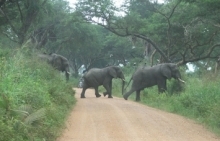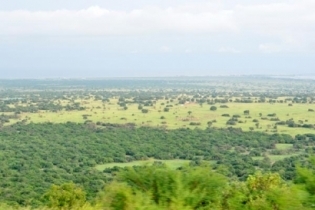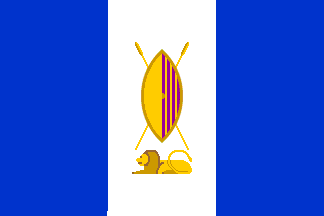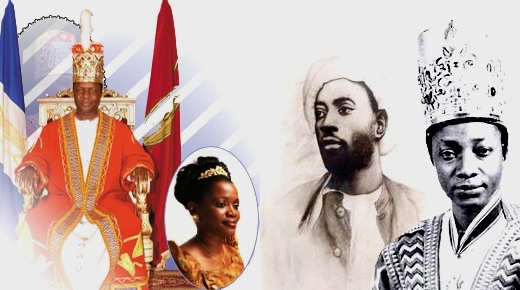Ekibiina kyobufuzi ekya Kabaka Yekka, UPC y’ Obote Ekiwera:
Obote yekyusiza abaamutuusa!
Mu mwaka 1965, Omubaka we kibiina kya KY Daudi Ocheng, yayisa ekiteeso kunsonga yokukusa zaabu we Congo namasanga g’enjovu, okubitunda munsi zebweru.
Dr Obote, nga Prime Minister, ne Minister Nekyon muganda wa Obote ne Onama Minister wa Defence bebatekebwa ko olunnwe nga bwebenyigira mulukwe luno.
Era Ocheng yaleeta ekiteeso ekirala, Colonel Amin okugira ng’awummuzibwako weeks bbiri nga Gavumenti bw’ebuuliriza.
Gwo omukago gwebyobufuzi wakati we kibiina kyo bufuzi ekya KY ne kibiina kyo bufuzi ekya UPC gwafiira ddala mu September 1964. Era 1965 gugenda okutuuka nga bangi ababaka ba UPC mu National Assembly (Parliament) bateesa kulaba nga bawera ekibiina kya Kabaka Yekka. Baakiyita kya bakyewaggula abatagoberera mateeka era abaagala okutabulatabula eddembe mu Uganda.
Abantu bangi baali bakwatiddwa era nga bali mu nkomyo na ddala e Luzira.
Obote yatekawo akakiiko kabulirize ku bya zaabu n’amasanga era abantu bangi ko baawa obujulirwa mu kakiiko ako, ebyama bingi ku kufuna n’okutunda zaabu n’amasanga ne bibikkulwa.
Naye report y’akakiiko bwe yaggwa Obote teyagifulumya! Parliement ye, Cabinet ye nabawagizi bangi aba UPC nebamuggyamu obwesige.
Yali asigazza kwesiga b’amagye bokka. Okuyimiriza Col. Amin yakigaana nakuza Amin mukifo kya Brigadier Opoloto. Mukuteesa kwa Cabinet okwaddako Obote yagenda kukwatta ba Minister be batano nabasibira e Luzira Criminal Prison.

The British Judge Allen
Current Ugandan political parties are just like anti-colonial movement parties of a bygone era:
Written by Professor J. B. R. Goya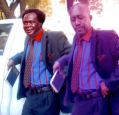
The term movement legacy was first coined by professor emeritus, Goran Hyden in 2011, and by it I mean a pattern of political behavior that characterized anti-colonial nationalist movements in their struggles for independence.
Half a century since most countries gained independence, this form of behavior continues to shape ruling- and opposition party politics in Africa and Uganda, while frustrating the prospects for deepening democracy.
CAUSE-EFFECT
Nationalist movements in Uganda were spearheaded by three main sections: World War II veterans, a small not so well-educated elite class of clerical workers, and leaders of a nascent civil society. These groups were united by a single but multi-faceted cause, namely to vanquish the colonial masters and take charge of the state apparatus.
Other than this mission, these groups remained committed to their particular identities. The issues were varied and subordinate to the cause. The anti-colonial movements adopted a simple but important strategy of popular mobilization for the cause. It was rare and in most cases illegal to campaign.
Most notably the movement against the British took place at the level of society because there were no representative bodies such as parliaments or legislative councils until much later in the struggle. Membership to these movements was rather diffuse and fluid, but because there was a single movement, this was not detrimental to its dynamic and operation.
POLICE BRUTALITY INCITING VIOLENCE:
Written by the observer, UgandaLocal election Observers have warned that the high handedness of Uganda Police and other security agencies against opposition politicians and the public could spark off election violence.
Yesterday police arrested more than 10 Forum for Democratic Change (FDC) officials including the presidential candidate Kizza Besigye, party chairman Wasswa Birigwa, party president Gen Mugisha Muntu, Acting chairperson Joyce Ssebugwawo, FDC women league leader Ingrid Turinawe among others together with other party flag bearers in different electoral positions.
Following the arrest of the FDC politicians, demonstrations erupted in different places around the city center including; Kiseka Market, Najanankumbi, Nateete, Wandegeya and Kawempe. Police and Military Police responded to the demonstrations by firing teargas and live ammunition to disperse the protestors. Media footage showed police brutality arrest people, directly spraying some with teargas.
Crispy Kaheru, the Executive Director Citizens' Coalition for Electoral Democracy Uganda (CCEDU) says during this critical time when the electoral emotions are high, police ought to restrain from being brutal and abusing the human rights of Ugandans as it may fuel electoral violence.
"I think they raise a lot more anxiety and potentially this is the time we should be seeing security agencies, police specifically taking more restrained measures in handling such situations not arrests. At this time you want to tamper the anxieties of people not to flare them. And for me the temptation is, such arrests could end up flaring up, could end up inciting the public which could act in irrational ways. We don’t want to see that", Kaheru said.

The African Police in Uganda is showing off its true colours on the African continent.
Police has been criticized locally and internationally for brutality and abuse of human rights in past by reports from Amnesty International, Uganda Human Rights Commission and other critical bodies.
Dr Martin Mwondha, the National Coordinator Citizens Election Observers Network-Uganda (CEON-U) says, the police despite its past record was expected to help achieve a free, fair and peaceful election which they have failed.
"Police intervention in blocking the movements of any citizen or any candidate is perceived as a big infringement on the rights of people. And that is what not we expect in an electoral process that is free and fair", Mwondha said.
However the deputy police spokesperson Polly Namaye says, they have practiced restraint from arresting people despite being pushed to the limits. Police has maintained that they have not arrested any politician during this election period but rather 'inconvenienced' the illegal activities of the politicians. Media reports and footage, however say otherwise.
"Those who are trying to announce themselves winners of the election at Najjanankumbi were inconvenienced and many of them were taken to their home aboard to ensure that they don’t continue with the press briefing that they were planning to do where they would announce themselves. But we also hope that they have learnt that you can not announce yourself an election winner when people are still voting.
And anyway there is only one instituion that is mandated to announce results - that is the Electoral Commission. When we see the assemblance of people burning tyres definitely we [would] arrest them but at the moment, No, we have not arrested anybody who was involved in burning tyres and also those who are attempting to burn the [police] vehicle but we hope they don’t do it", Namaye said.
SDP's Mabikke sued over change of a political party name in Uganda:

Mr Michael Mabikke Chairman of the political party SDP.
Accused of changing the party name, Michael Mabikke has been sued by four members of his Social Democratic Party (SDP).
The quartet accuses Mabikke of conniving with Henry Lubowa, the party’s secretary general, and the Electoral Commission to illegally change the party’s name to Party of National Unity. The complainants are Asea Azuma, Fred Kavuma, Ahmed Sserunjogi and Harriet Namujju.
In their suit, filed in the High court yesterday, they also claim that the respondents illegally changed the SDP constitution. They claim that on September 11, 2013, the party’s national council held a meeting at the Youth Sharing hall in Nsambya.
According to the complainants, the meeting discussed one thing: whether SDP should form a political alliance with another political party. They say the idea of an alliance was flatly rejected.
“The second respondent [Lubowa] with full knowledge and support of the first respondent [Mabikke] herein clandestinely and in contravention of the party constitution wrote to the secretary general of the Electoral Commission on October 17 2013 alleging that the party had passed a resolution to have the name of the party changed while on the contrary it was not on the agenda nor discussed by the said committee,” the plaint partly reads.
Through Ruhinda advocates and solicitors, the trio accuse the Electoral Commission of failing to carry out due diligence when it approved the name change at the end of September 2014.
They insist that the EC should have cross-checked whether it was the national delegates’ conference which sanctioned the change of the name since such powers reside with it.
“The first and second respondents contravened articles 2(1),71(1) and 72(2) of the Constitution of Uganda and the decision to change the party’s name to the Party of National Unity was arbitrary since it was executed by the first and second respondents in total disregard of Article 10(1) of the constitution,” they claim.
Consequently, they want court to declare that there is no party called Party of National Unity. They want the High court to order the third respondent [Electoral Commission] to strike out the name Party of National Unity and restore the party’s name of Social Democratic Party.
They also want court to order all the respondents to pay exemplary damages for their failure to adhere to both the national constitution and SDP constitution.
Senior SDP leaders have backed former Vice-President Gilbert Bukenya to run as the party’s presidential candidate in 2016. But they have strongly rejected claims by other leaders, that the party was sold to Bukenya.
Uganda democratic elections can't oust dictator Museveni as the president of Uganda:
research has found out:
16 January, 2015

Museveni making voting deals lately for presidential elections
A new book authored by political scientists backs Col Kizza Besigye’s view that it is impossible to oust President Museveni through elections he organises and controls.
Titled Elections In A Hybrid Regime: Revisiting The 2011 Ugandan Polls, the book by local and international researchers comes to the conclusion that an election is unlikely to cause political change or bring about democratisation in Uganda under the current circumstances.
“It appears a distant possibility that elections per se will change the top leadership in Uganda under the existing institutional framework,” the book claims.
Launched on January 7 at Hotel Africana, the book analyses Uganda’s evolving electoral democracy, issues that shape it, voters’ behaviour and how elections are managed.
The 495-page book is a product of a joint academic research project that aims to encourage a better understanding of the 2011 elections in Uganda.
The authors include Makerere University political science lecturers; Dr Sabiti Makara, Dr Julius Kiiza, Dr William Muhumuza and Dr Paul Omach.
2011 elections
It would be erroneous to conclude that President Museveni and his NRM’s victory in the 2011 elections represents a strengthening of political authority and legitimacy, the authors state. Their argument is that the election outcome was explained by several reasons as inferred from the analysis of voter behaviour and the political environment.
These reasons include a high rate of voter abstention, massive distribution of financial and material incentives, and application of at least subtle violence. According to the researchers, there was an attempt through subtle violence and other means to send a message to the electorate that the regime is still in charge at least in the short run or medium term.
“Regarding this last point, we argue that the electorate...rejected the opposition for fear of political or economic marginalisation - a position that raises essential questions about what it means to be in the opposition in contemporary Uganda,” the book states.
“Our argument is not that the elections cannot lead to an alternation of power, but that the electorate internalised the idea that it could not,” the authors note.
NRM vs opposition
While acknowledging that the NRM victory is majorly explained by its fusion with the state apparatus, the authors note that opposition parties are weak, and thus unable to put up a formidable challenge.
“On its part, the opposition took it for granted that they had significant and growing support and therefore failed to address its internal weaknesses,” the book states, pointing at the failure to establish structures and lack of clear and sustainable sources of funding as some of the weaknesses.
The researchers define Uganda as a pseudo democracy, which in form has democratic institutions but in substance is authoritarian.
“Hybrid regimes like that of Uganda are interesting to analyse, not as renewed examples of authoritarian regimes but regimes that carry new forms of control and domination,” the book notes.
The authors point out that the 2011 elections were not marked by repression of the opposition as was the case was in 2001 and 2006, but note that the previous acts and the subtle violence against the opposition have “generated an internalised violence that has induced new behaviours.”
In their assessment of election management, the authors note that President Museveni’s appointed Electoral Commission is not competent to organise free and fair elections.
“Genuine, rule-bound competitive politics that produces respectable and acceptable results is still a pipe dream in Uganda,” argues Makara in Chapter 4.
“Greed for power and the unwarranted desire for incumbents to stay at the helm indefinitely rarely give rise to [a] full democratic process.”
The insights on election management in the book come at a time when the opposition and civil society groups have been agitating for electoral reforms. Among others, the activists want the Electoral Commission to be constituted by the Judicial Service Commission.
On the role of security forces in elections, the book notes that their role should be clearly defined. It also calls for the issue of campaign financing to be addressed.
Asked to comment on the book, Jotham Taremwa, the EC spokesman, said: “Where do they get the competence to evaluate the elections? Being a political scientist does not make one an expert on elections. We have organised elections that have put governments in place,” he said.
Mbabazi man wants the ruling Political party of NRM dissolved:
25 February, 2015
Court orders EC to reveal NRM funders:
A chief magistrate’s court has ordered the Electoral Commission to reveal the source of money and names of funders of the ruling NRM.
The order was issued by Timothy Lumunye at Nakawa on October 31, 2014 but six months down the road the EC has not complied.
The order stemmed from a case filed by Francis Atugonza (not the former mayor of Hoima and FDC supporter). Atugonza wanted to access the party’s audited accounts between 2010 and 2013 from the EC. When the EC failed to act on his request last year, Atugonza took the matter to court.
According to the order, EC should provide Atugonza with information regarding the “records of contribution, donation or pledges made by the founders or promoters of NRM, statements of accounts showing sources of funds and the names of persons that have contributed [to NRM], properties belonging to the party and annual audited accounts for the period NRM has been in existence to date.”
The court order is addressed to the chief executive officer of the EC, who in this case is Sam Rwakoojo, the secretary. Asked to comment on the matter, Jotham Taremwa, the EC spokesperson, said he was not aware of the court order. He said the EC is not in the habit of hiding information from the public.
“There is nothing to hide [about the operations of political parties]. Anybody can request information from the political parties’ desk and it will be given to you,” he said.
Nicholas Opiyo, a lawyer, said the only way the order can be enforced is by Atugonza seeking another court order of mandamus (an order compelling a public official to perform his/her duty).
“When you have this order, the officer who is supposed to provide this information can be personally held liable for not doing their duty,” Opiyo said.
MBABAZI’S HAND
Atugonza, we have been told, is a supporter of former Prime Minister, Amama Mbabazi. He is also a member of the “Mbabazi western brigade”, a loose group set up by activist Ellady Muyambi to mobilise political support for the former NRM secretary general in western Uganda.
Mbabazi, so far, remains tightlipped about his presidential ambitions. Muyambi told The Observer yesterday that they are aware that NRM has not furnished the EC with its audited accounts for the last three years. If any exist, he said, they are forged.
“The accounts have to be signed by three people: the party chairman, the treasurer and the secretary general. As far as we know, Mbabazi has not appended his signature to any NRM accounts in the last three years,” Muyambi claimed.
Rose Namayanja, the NRM treasurer, said on Tuesday that she could not comment on issues related to the NRM accounts because she is still acquainting herself with her new role.
“I am still new in the office. I will check and get back to you,” she said.
NRM’s source of funding remains a mystery. While the party’s 264 MPs make a monthly financial contribution, the money amounts to about Shs 50m per month and is therefore too little to sustain NRM activities, including running the secretariat.
According to sources, President Museveni, the party chairman, remains its main funder. This realization has encouraged critics to allege that the president is abusing public resources to bankroll partisan activities.
DISSOLVE NRM?
Muyambi said they have given the EC two weeks, with effect from February 23, to comply with the order or face the consequences. Should it fail, he said, their lawyers would demand that NRM be de-registered.
According to section 21 (1) of the Political Parties and Organisations Act (PPOA), failure by a political party to comply with any of the provisions of the act, including annual declaration of its accounts to the EC, is ground enough to have it de-registered. Yet the same act in section 9 (6) says it is only the EC that can lodge such a request at the High court.
Last year in April, the High court approved a request by the EC to deregister 10 political parties accused of failing to comply with certain provisions of the act, particularly section 9. Peter Walubiri, a constitutional lawyer, said it is difficult for an ordinary member to successfully pursue the issue of de-registering a party in court.
“What a member can do is to take on the EC for its omission or for not playing its role. Otherwise I do not know under which law someone can seek to dissolve a party,” Walubiri said.
Indeed this citizen is a flower:

Martin Niemoeller was a Protestant pastor born January 14, 1892, in
Lippstadt, Westphalia.

He was a submarine commander in World War I.
He was anti-communist and initially supported the Nazis until the church
was made subordinate to state authority.
In 1934, he started the Pastors’ Emergency League to defend the
church. Hitler became angered by Niemoeller’s rebellious sermons and
popularity and had him arrested on July 1, 1937. He was tried the
following year and sentenced to seven months in prison and fined.
After Niemoeller's release, Hitler ordered him arrested again and he
spent the next seven years in concentration camps in “protective
custody.“ He was liberated in 1945 and was elected President of the
Protestant church in Hesse and Nassau in 1947. He held the title until
1964. He was also a President of the World Council of Churches in the
1960’s.
Niemoeller was a pacifist who spoke out against nuclear weapons. He is
best known for his powerful statement about the failure of Germans to
speak out against the Nazis:
“First they came for the Communists, but I was not a Communist so I
did not speak out. Then they came for the Socialists and the Trade
Unionists, but I was neither, so I did not speak out. Then they came
for the Jews, but I was not a Jew so I did not speak out. And when
they came for me, there was no one left to speak out for me.”
He died in Wiesbaden on March 6, 1984.
